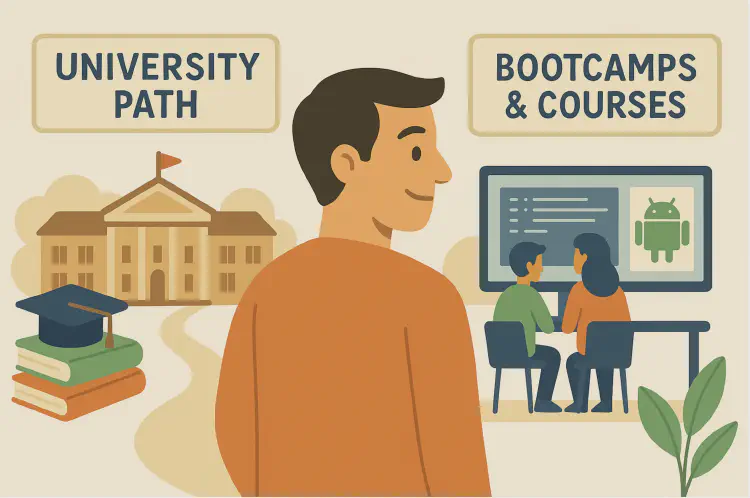Do You Need a Computer Science Degree to Become an Android Developer?
Explore whether formal education is necessary for Android development and discover alternative paths to start your career.
- | 5 min read

If you’re aspiring to become an Android developer, you might be wondering whether a computer science degree is necessary for success. The truth is more flexible than you might think. While a degree can provide a strong foundation, it’s not the only pathway to becoming a successful developer. Today, the tech industry values practical skills that can be cultivated through multiple routes beyond formal education. In this article, we’ll explore the role of formal education and the alternative paths you can take toward building a rewarding career as a developer.
The Role of a Computer Science Degree
While we’ll be exploring alternative paths to an Android development career, it’s important to acknowledge the value of the traditional route through formal education. A computer science (CS) degree provides a solid foundation in programming fundamentals and core concepts, making it easier to learn Kotlin, Java, or the Android SDK, and offering context for designing efficient applications.
Employers may also view a CS degree as a signal of dedication, critical thinking, and technical rigor, which can be an advantage when applying to large companies. However, a degree is not always a strict requirement. Many tech companies are increasingly prioritizing skills and demonstrable work over formal credentials. This shift has created opportunities for self-taught developers, bootcamp graduates, and online learners to thrive in the Android ecosystem.
Self-Learning: A Modern Alternative
Self-learning has become a mainstream path into Android development. Platforms like Udemy, Coursera, and Codecademy offer comprehensive courses covering everything from Kotlin basics to advanced app development. Google also provides official resources designed to help beginners gain the skills needed to build apps efficiently.
The biggest advantage of self-learning is flexibility. You can progress at your own pace, focus on areas most relevant to your career goals, and immediately apply new knowledge to personal projects. Many self-taught developers begin with small apps to practice coding, understand app architecture, and build a portfolio. This hands-on experience often impresses employers just as much as formal education.
That said, self-learning requires discipline, motivation, and a structured approach. Without these, it can be easy to lose focus or struggle to reach the level of consistency needed to grow as a developer.
Structured Courses and Bootcamps: The Guided Alternative
If you feel that structure and guidance are some of the elements that you need to stay on track, this path may be the right choice for building your Android development career. Bootcamps and online courses provide a structured environment with intensive, focused training. Typically lasting just a few months, Android development bootcamps cover the essentials of Kotlin, app lifecycle management, UI/UX design, and backend integration. High-quality programs often go further, offering career support, portfolio-building exercises, and mock interviews to prepare you for real-world job applications.
The immersive nature of bootcamps and courses help beginners quickly gain practical skills and confidence. They also provide a clear roadmap and deadlines, something self-study often lacks. A major advantage of this approach is that by the time you finish, you’ll have a portfolio of completed apps that demonstrate your abilities in a tangible way, making you more appealing to recruiters.
Building a Portfolio: Proof Over Credentials
Regardless of your educational path chosen, a portfolio is arguably the most critical asset as an aspiring Android developer. A portfolio demonstrates what you can create, your coding style, and your problem-solving approach. Personal projects, freelance apps, contributions to open-source projects, or apps shared on GitHub or Google Play serve as proof of your abilities.
Employers increasingly focus on what candidates have built rather than where they studied. A well-crafted portfolio compensates for the absence of a formal degree, showcasing initiative, persistence, and technical proficiency.
Networking and Community Engagement
Learning to code is only one part of building a career. Networking, community involvement, and mentorship can play a decisive role. Engaging in developer forums, attending local meetups, or joining online communities can provide guidance, feedback, and even job opportunities. Bootcamps often facilitate this by connecting students with alumni or industry professionals, while self-learners can leverage platforms like LinkedIn or GitHub to showcase their work and connect with potential employers.
Key Skills for Android Developers
Whether you pursue a degree, a bootcamp, an online course, or self-study, there are core skills every Android developer should master:
- Programming Languages: Kotlin is now the official language for Android development, though Java remains relevant.
- Android SDK & Jetpack Components: Understanding the tools and libraries that simplify app development.
- UI/UX Design Principles: Building apps that are not only functional but also user-friendly.
- Version Control: Familiarity with Git and GitHub for collaborative coding.
- Testing & Debugging: Writing tests and troubleshooting issues efficiently.
These skills can be learned through a combination of courses, tutorials, and personal projects; often without a formal degree.
Studying Android Development at Linero Tech
At Linero Tech, we offer a practical, beginner-friendly Android Developer programme that teaches you everything you need to get started in mobile development. Whether you’re learning from scratch or transitioning from another field, our course helps you go from zero to building real apps, step by step.
You’ll learn with hands-on projects, guided by an experienced instructor, and graduate with a portfolio of apps that showcase your skills. We focus on Kotlin, the latest best practices, industry-relevant knowledge, to make sure you’re ready for your first job as a junior Android developer.
If you’re excited by the idea of making apps that people use every day, solving meaningful problems, and joining a global community of developers, then Android development might just be the perfect path for you.
Ready to turn your app ideas into reality?
👉 Discover our tech training programs
👉 See student reviews and success stories
